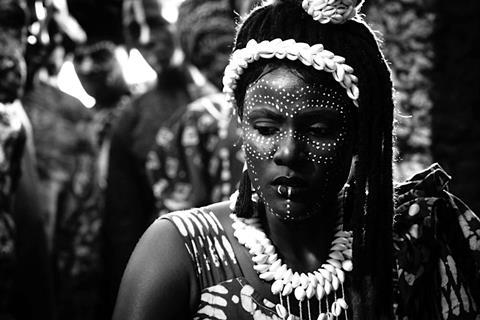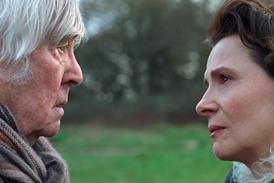A West African village finds itself at a spiritual crossroads in CJ ‘Fiery’ Obasi’s striking third feature

Dir: CJ ‘Fiery’ Obasi. Nigeria, France, UK. 2023. 113mins
Myth, the matriarchy, power and the patriarchy wash over one another in CJ ’Fiery’ Obasi’s layered and beguiling third feature. The Nigerian filmmaker’s latest draws on the fables surrounding the ambivalent water goddess of its title as a small West African town finds itself torn between faith in the status quo and the promise of technological advancement.
Obasi teases at ideas surrounding the balance of power and the desire to control it
The film has been enjoying a strong festival run since its cinematographer Lilis Soares deservedly took home a Special Jury Prize for her exquisite black and white cinematography at Sundance earlier this year - this month alone it has screened at Karlovy Vary, Neuchatel International Fantastic Film Festival in Switzerland and Montreal’s Fantasia. It will be distributed in the US by Dekanalog in September, and its sumptuous look and accessible but distinctive storytelling should spark arthouse interest in other territories.
The small village of Iyi is ruled by Mama Efe (Rita Edochie), who acts as an intermediary between the villagers and West African water deity Mami Wata. In the spirit of much good folklore, Mama Efe has two children. She claims one daughter, Zinwe (Uzoamaka Aniunoh), was sent to her by Mami Wata; the other, Prisca (Evelyne Ily) was a war orphan she took in. Tensions are evident between Mama Efe and Zinwe from the start, with the younger woman believing she would make better use of her mother’s intermediary powers. After Zinwe steals her mother’s bracelet totem and discovers that getting an audience with a goddess is harder than she thought, she scarpers. This puts the cohesion of the family and the community under threat.
Soon Mama Efe’s abilities are called further into question as one of the young men in the community, Jabi (Kelechi Udegbe), begins to rabble-rouse. Doubts begin to mount amongst the townsfolk about their reliance on Mama Efe rather than modern inventions including vaccines, hospitals and schools. Prisca rescues a male stranger, Jasper (Emeka Amakeze) from drowning, whose presence complicates things still further. There’s a fierce grace to the acting in general but Ily stands out with a performance that moves Prisca from the playful to the profound.
Obasi infuses the action with an other-worldliness. Although cigarettes, guns and Prisca’s motorbike speak to a modern era, the folklore lends the action a timeless quality – emphasised by dips into expressionism in certain scenes which flip between reality and the characters’ imaginings. The writer/director often lets dissolve shots of the waves linger over another image, which not only emphasises the town’s connection to the sea but helps with the flow of the film.
The use of West African Pidgin, with its hybrid vocabulary, is at once familiar but also alien to non-speakers, adding to the film’s poetic and elusive qualities. Meanwhile the brilliant white of sea shells in the women’s hair, strikingly patterned costuming and the face paint worn by men and women alike – intricately designed by Adefunke Olowu, Bunmi Demiola Fashina and Campbell Precious Arebamen respectively – help generate a shimmering sense of heightened reality.
Obasi teases at ideas surrounding the balance of power and the desire to control it. While the matriarchy is shown to be multifaceted and less than perfect it seems that, the potential patriarchy, for all the change it promises, offers little more than violence. Zinwe and Prisca may fight but, notably, their interaction becomes one of coming together rather than tearing apart. There’s a nod to the corrupting force of colonialism too, as it is a white man who brings guns to the town, while the occasional outbreaks of English generate a more threatening tone.
The film weaves these themes in lightly so that the intergenerational and community tensions remain grippingly poised, the mood further enhanced by music from Tunde Jegede, whose score takes on a metronomic rhythm in moments of dread. Obasi may be exploring familiar themes and drawing on elements of established fables, but in his hands they feel as fresh and invigorating as waves crashing on sand.
Production companies: Fiery Film Company
International sales: Alief info@alief.co.uk
Producers: Oge Obasi
Screenplay: CJ ‘Fiery’ Obasi
Cinematography: Lilis Soares
Production design: The Fiery One
Editing: Nathan Delannoy
Music: Tunde Jegede
Main cast: Evelyne Ily, Rita Edochie, Uzoamaka Aniunoh, Emeke Amakeze, Kelechi Udegbi
























